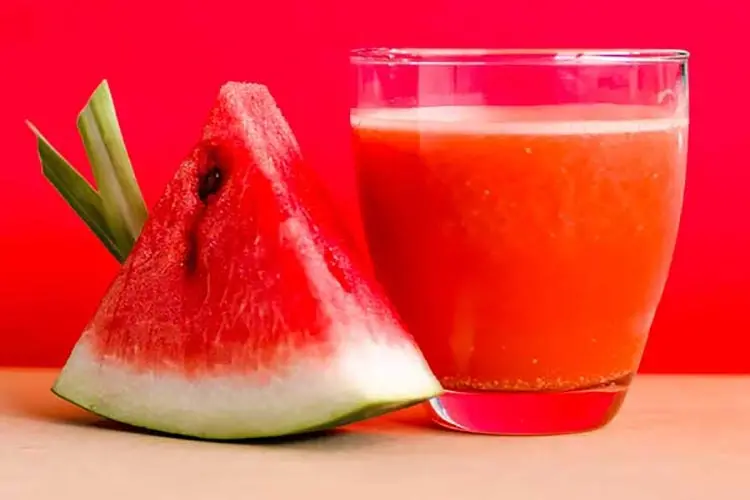When the summer heat hits, there’s nothing quite as refreshing as a juicy slice of watermelon. But did you know that this hydrating fruit could actually help you with your health goals? Let’s dive into the world of watermelon—its vitamins, its benefits, and how you can incorporate it into your diet in a fun and tasty way!
Watermelon: Not Just a Summer Treat
Watermelon isn’t just for picnics and poolside snacks. It’s packed with vitamins and nutrients that can do wonders for your body. In fact, watermelon is about 92% water, which makes it a great way to stay hydrated—especially on those scorching summer days.
But watermelon is more than just a source of water. It’s loaded with vitamins and antioxidants that help keep you feeling great and even support weight loss. Whether you’re munching on it between meals or making a delicious smoothie, watermelon is the perfect snack for anyone looking to eat healthily without sacrificing flavor.
What’s Inside a Watermelon?
Before we get to the fun part (the benefits), let’s take a quick look at the star player: the nutrients inside watermelon. Here’s what makes this fruit a true hero for your health:
- Vitamin C: This antioxidant is essential for boosting your immune system. A single serving of watermelon can give you a good chunk of your daily vitamin C needs. So, if you want to fight off those pesky colds, watermelon might just be your best friend!
- Vitamin A: We all know vitamin A is great for our vision, but it also supports healthy skin and a strong immune system. Watermelon is a great source of this vitamin too, helping you maintain that fresh, glowing skin.
- B Vitamins: Watermelon also contains several B vitamins, including B1 (thiamine) and B6 (pyridoxine). These vitamins are important for your metabolism, energy levels, and even brain function. So, a slice of watermelon can give you the mental and physical energy boost you need to take on the day.
- Lycopene: If you’re not familiar with lycopene, it’s a powerful antioxidant that gives watermelon its red color. It’s also known for its potential to reduce the risk of certain cancers and heart disease. Lycopene is a superhero in the fruit world—plus, it’s a great way to sneak some cancer-fighting goodness into your diet!
- Potassium: Watermelon contains a good amount of potassium, which is essential for maintaining healthy blood pressure. If you’re sweating it out at the gym or simply sweating because it’s too hot outside, potassium helps to balance your body’s electrolytes and prevent dehydration.
Watermelon and Weight Loss: A Sweet Diet?

Now, you might be thinking: “Okay, this sounds great, but can watermelon actually help me lose weight?” Well, here’s the juicy (pun intended) answer: Yes, it can!
Since watermelon is so high in water and low in calories, it can help keep you full without adding a bunch of extra calories to your diet. This makes it an excellent food choice for anyone looking to manage their weight. Plus, its sweetness makes it a perfect substitute for sugary snacks. So, the next time you’re craving something sweet, reach for a slice of watermelon instead of that chocolate bar.
Not only does watermelon keep you feeling satisfied, but it also promotes good digestion. Watermelon is rich in fiber, which helps your digestive system function smoothly. When your digestion is on track, it’s easier for your body to absorb nutrients and keep things running efficiently.
How to Include Watermelon in Your Diet
Watermelon is super versatile, and there are many ways you can enjoy it beyond just slicing it up. Here are a few fun ways to include watermelon in your daily meals:
- Watermelon Smoothie: Blend watermelon with a little bit of mint, lime, and a splash of coconut water for a refreshing smoothie. It’s like summer in a glass!
- Watermelon Salad: If you’re looking for a light and healthy lunch, try making a watermelon salad. Just chop up some watermelon, cucumber, and a handful of fresh mint. For an extra boost, sprinkle on some feta cheese and drizzle with a little balsamic vinegar. It’s a perfect balance of sweet and savory.
- Watermelon Popsicles: Freeze watermelon juice in popsicle molds for a cool treat on a hot day. You can even mix it with other fruits like strawberries or kiwi for a fruity explosion of flavor.
- Watermelon Juice: If you’re craving something hydrating, juice up some fresh watermelon and sip it like a refreshing beverage. It’s the perfect way to quench your thirst and get a dose of vitamins at the same time.
- Grilled Watermelon: Yes, you read that right—grilled watermelon! Grilling watermelon brings out its natural sweetness and adds a fun twist to your summer barbecues. Slice it into thick pieces, grill for a few minutes, and enjoy a unique and tasty treat.
Health Benefits of Watermelon

Now that we’ve covered the basics of what’s inside watermelon, let’s explore the specific benefits of adding this fruit to your diet.
- Hydration: Since watermelon is 92% water, it’s an excellent fruit to keep you hydrated. Staying hydrated is crucial for everything from skin health to proper digestion. When the heat is on, watermelon helps you beat the heat and stay refreshed.
- Improves Heart Health: The lycopene in watermelon has been linked to improved heart health. Research shows that it may help lower blood pressure and reduce cholesterol levels. So, by munching on this delicious fruit, you might be doing your heart a favor.
- Fights Inflammation: Watermelon contains anti-inflammatory compounds, which can help reduce inflammation in the body. Chronic inflammation is linked to several health problems, including arthritis and heart disease, so eating foods that fight inflammation is always a good idea.
- Boosts Skin Health: If you’re after that glowing skin, watermelon is your friend. The vitamins A and C in watermelon support healthy skin and help with collagen production, keeping your skin smooth and youthful. Plus, staying hydrated with watermelon will prevent your skin from getting dry and flaky.
- Improves Digestion: The fiber in watermelon helps keep your digestive system on track. Good digestion is essential for overall health, as it ensures your body is properly absorbing nutrients from the food you eat. So, by eating watermelon regularly, you’re not just getting a tasty treat—you’re also giving your digestive system some TLC.
- Supports Muscle Recovery: If you’ve been working out or doing any physical activity, watermelon can help you recover faster. The potassium and magnesium in watermelon help replenish lost electrolytes, which can help reduce muscle cramps and soreness.
Potential Side Effects of Watermelon

While watermelon is generally safe to eat for most people, there are a few things to keep in mind. If you eat too much watermelon in one sitting, you might experience some bloating or discomfort due to its high water content. It’s always best to enjoy watermelon in moderation.
Additionally, if you have any allergies to melon (including cantaloupe or honeydew), you should avoid watermelon as well. Always listen to your body, and if you have any concerns, consult with a healthcare professional.
Conclusion
Watermelon isn’t just a refreshing summer treat—it’s a nutritional powerhouse that can boost your health in many ways. Whether you’re using it to stay hydrated, improve your heart health, or support weight loss, watermelon is a delicious and easy way to add more vitamins and nutrients to your diet.
So, next time you’re at the grocery store, pick up a watermelon, and start enjoying all the amazing benefits it has to offer. Not only will it keep you cool and hydrated, but it might just become your new favorite snack!
Remember, health doesn’t have to be complicated or boring. Sometimes, a sweet, juicy slice of watermelon is all you need to stay on track. Stay healthy, stay hydrated, and enjoy the sweet taste of watermelon—your body will thank you!



